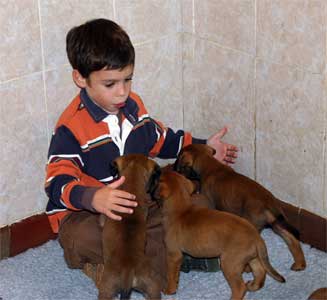
Pepe y la Camada Autos Locos de Castro-Castalia
Bloat is a very serious, life-threatening condition associated to large breed deep-chested dogs. A real emergency.
While the diagnosis is simple, the pathological changes in the dog's body make treatment complicated, expensive, and not always successful. Death rates are high even amongst those dogs that are immediately taken for urgent treatment.
It seems to be associated primarily to dogs that are fed only once a day and who have the habit of bolting food, gulping air, or drinking large amounts of water immediately after eating. When you add vigorous exercise right before or after a full meal, you have the recipe for bloat.
Simple gastric distension can occur in any breed or age of dog and is common in young puppies who overeat. This is sometimes referred to as “pre-bloat” syndrome, while belching of gas or vomiting food usually resolves the problem. If this condition occurs more than once in a predisposed puppy, it may be wise to discuss methods to prevent bloat with your vet, including prophylactic surgery to anchor the stomach in place before the torsion occurs, particularly in dogs whose close relatives have had GDV.
When bloat occurs, there is a twisting of the stomach (as it flips on its long axis) after gastric distension; the oesophagus closes off, limiting the dog's ability to relieve distension by vomiting or belching. Often the spleen becomes entrapped as well, and its blood supply is cut off.
All these happenings, lead to a complex chain of physiologic events; the blood return to the heart decreases, cardiac output decreases, and cardiac arrhythmias will usually follow. Toxins build up in the dying stomach lining and necrosis occurs. The liver, pancreas, and upper small bowel may also be compromised. Shock from low blood pressure and endotoxins rapidly develop. Sometimes the stomach ruptures, leading to peritonitis.
The main symptoms a Bullmastiff owner should watch for when there is a suspicion that bloat may occur, are:
Abdominal distension.
Exaggerated salivating.
Exaggerated panting.
Restlessness.
Incapability to remain seated or to lay down.
Physical impossibility to vomit and/or.
Vomiting rests of saliva or water immediately after drinking.
Depression and lethargy.
Weakness.
Rapid heart rate.
Blueing of the gums and tongue and, ultimately.
Shock.
Prevention of GDV is preferable to treatment:
In susceptible dogs feed two or three meals daily;
Discourage rapid eating;
Train the dog to eat while laying or sitting in the floor, not standing
Do not allow any kind of exercise from one hour prior to two hours after a meal
Consider having gastroplexia performed as a prophylactic measure
While the genetics of GDV are not completely worked out, most breeders and veterinarians feel there is some degree of heritability. Therefore it makes sense not to breed dogs who are affected or who are close relatives of those suffering from GDV.
The good news is that bloat does not seem to be a high risk in the “CASTRO-CASTALIA” Bullmastiffs and no single case has been referred, so far, relating to any dog or female bred by. Yet it must be mentioned that bloat is a condition that is often related to Bullmastiffs and there are many bloodlines and families that carry the proneness along. So, when you are considering the purchase of a puppy, make sure you discuss this issue with your breeder before you go any further.
(Texto original, escrito por Christina de Lima-Netto y/o Federico Baudin específicamente para esta página Web y protegido con Copyright. No puede ser reproducido ni total ni parcialmente por ningún medio, sin el expreso consentimiento de Castro-Castalia por escrito)
LAS FOTOGRAFIAS SON MERAMENTE ILUSTRATIVAS NO UNA INDICACION DE QUE LOS EJEMPLARES PADEZCAN DICHA ENFERMEDAD.
|